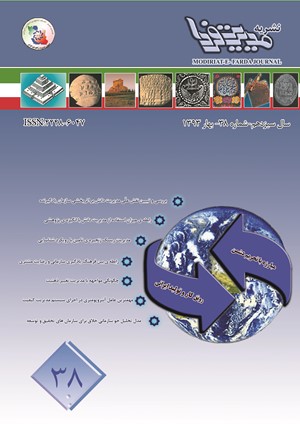بررسی و تبیین نقش علّی مدیریت دانش در اثربخشی سازمان یادگیرنده (مطالعه موردی؛ دانشگاه علم و صنعت ایران)
محورهای موضوعی : مدیریت دانش
1 - دانشگاه علم و صنعت ایران
2 - دانشگاه علم و صنعت ایران
کلید واژه: ﺳﺎزﻣﺎن ﻳﺎدﮔﻴﺮﻧﺪه ﻳﺎدﮔﻴﺮي ﺳﺎزﻣﺎﻧﻲ اثربخشی ﻣﺪﻳﺮﻳﺖ داﻧﺶ,
چکیده مقاله :
در اين پژوهش، هدف، بررسی و تبیین نقش علّی مدیریت دانش در اثربخشی سازمان یادگیرنده بود. روش تحقیق، پيمايشي و ابزار جمع آوري اطلاعات پرسشنامه بوده که يك پرسشنامه ي جامع برای سنجش اثربخشی سازمان - بر طبق مدل کارکردهای چهارگانه نظام اجتماعی پارسونز (انطباق و سازگاری، تحقق اهداف، یگانگی و انسجام، پایداری و حفظ الگوها)- و مدیریت دانش - بر طبق مدل نوناکا و تاکیوچی- طراحی و بکار گرفته شد. داده ها از بین کارکنان آموزشی دانشگاه علم و صنعت ایران، گردآوری شد. بر طبق تجزيه و تحليل داده هاي پژوهش، و بررسی رابطه علت و معلولی دو متغیر، بین مؤلفه های مدیریت دانش (اجتماعی کردن، برونی سازی، ترکیب، درونی سازی) و اثربخشی سازمان یادگیرنده رابطه معنادار مثبتی شناسایی گردید. و جهت این رابطه از مدیریت دانش به سمت سازمان یادگیرنده تشخیص داده شد. همچنین یافته های پژوهش نشان داد که عوامل جمعیت شناختی (سن،سابقه کار،سطح تحصیلات، وضعیت استخدامی، سمت شغلی) بر رابطه فوق، تأثیر چشمگیری دارند در حالیکه جنسیت بی تأثیر است.
In this study, the goal was to examine and explain the causal role of knowledge management in the effectiveness of the learning organization. Methods of survey research and data collection tool was the questionnaire. A comprehensive questionnaire to measure effectiveness of the organization - has been designed and implemented according to The four functions of social system model of Parsons (Adaptation, Effectiveness,Unity and coherence, Stability & Maintain patterns), and Knowledge Management –was designed and employed according to Nonaka and takeuchi’s model. Data collected from the teaching staff of the University of Science and Technology.According to the analysis of research data, and the causal relationship between two variables, a positive meaningful relationship between KM Elements (Socializing, externalizing, combination, internalization) and the effectiveness of the learning organization was identified, and the direction of the relationship was detected of KM towards the learning organization. Also our findings indicated that demographic factors (Age, Work experience, Education level, Employment status, Position) of the above equation, have significant impact, Where as Gender has no effect.


